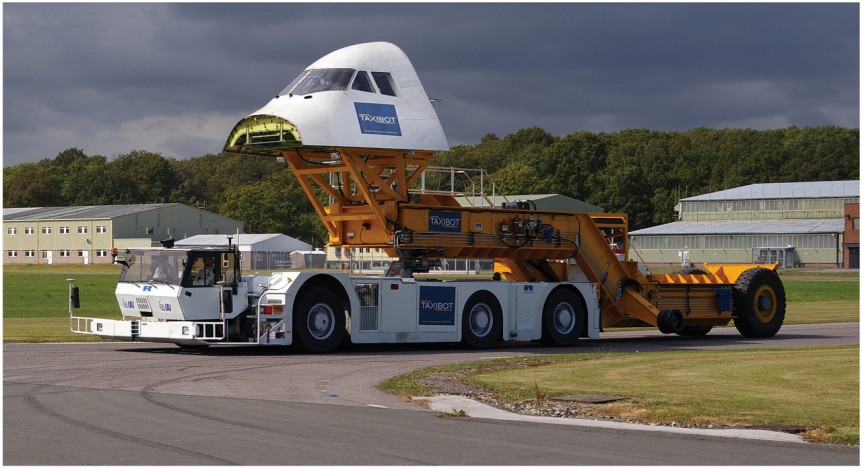What seemed like an easy transition a few years ago has been delayed by one developer. “Safran and Honeywell have delayed by two years the planned entry into service of their electric green taxiing system (EGTS), a device designed to enable an airplane to taxi with its engines shut down. Aviation International News (AIN) quoted a spokesperson as saying, “The team is still working on the program with a goal of certification in 2018 and entry into service shortly after.” The system uses motors on the main gear to enable taxiing under power. One of several competing systems, WheelTug, has motors on the nose gear only. Wheeltug uses a Boeing 737-800 as a testbed for the certification program. A United States company with manufacturing apparently based in Gibraltar, WheelTug claims orders for 985 systems by 22 airlines. Another system, TaxiBot, was developed by Israel Aerospace Industries in cooperation with France’s TLD, Germany’s LufthansaLEOS, the ground-handling component of the airline. The …
Commercially Viable (and Nearly Buyable) Australian Algae-Based Biofuel
Both Aviation Week and Flight Global reported on Algaetec’s announcement at the ILA (Berlin Air Show) that it had signed a memorandum of understanding with Lufthansa to provide algae-based jet fuel to the German carrier. Algae.Tec is an Australian maker of clear algae oil that pulls CO2 from industrial processes, combines it with sunlight, and produces large batches of odorless oil. The product achieves the “holy grail” of sustainability, according to Executive Chairman Roger Stroud, because it is made from non-food sources, unlike corn- or agave-based ethanol, for instance. It also uses CO2 that would otherwise be subject to expensive sequestration processes. The technology is proprietary and barely hinted at in the company’s videos, but is housed in 40-foot long shipping containers connected to solar arrays. CO2 and sunlight combine to produce a fuel stream in a compact production space. Aviation Week reports that, “The company’s process grows algae in a controlled environment in 40-ft shipping containers, feeding the algae …
Being Led By The Nose
With speculation in CAFE circles about the use of thin, lightweight motors now available for landing and takeoff augmentation, it comes as almost now surprise that DLR, the German Aerospace Centre, and the Airbus people at EADS have announced development of an electric nose wheel that could replace airport tugs and extended ground operation for airliners’ jet engines. According to The Engineer, a British publication, a fuel cell-powered system delivers electrical energy capable of powering the nose wheel of a 70-ton aircraft. “Commercial aircraft could cut their on-ground emissions by one quarter with a new hydrogen fuel-cell propulsion system, according to its creators. “For short-haul aircraft that often take off and land seven times a day, this could save between 200 and 400 litres of kerosene per day while reducing noise by around 95 per cent, without the use of towing vehicles.” Tested in the DLR laboratories, the twin electric motors are about to be checked out on a real A320. …
Rising Oil Prices a “Wake-up Call”
With revolt and possible revolution threatening the shutdown of the Suez Canal and driving crude oil prices up, a recent article in Flight Global merits reflection. Flight Global’s lead sums up a threat and a hope in one tidy paragraph. “The International Energy Agency raised an alarming note as our power-hungry lives got back into gear after the holidays. ‘Oil prices are entering a dangerous zone for the global economy. The oil import bills are becoming a threat to the economic recovery. This is a wake-up call to the oil-consuming countries and to the oil producers,’ it said.” With fuel prices at the end of 2010 up one-fifth over those at the end of 2009, ticket prices necessarily follow, with the danger of lower passenger loads, fewer flights, and generally diminished convenience and economy for air travellers. Some carriers such as RyanAir, already notorious for suggesting pay toilets on their airliners, tactically hedge by buying an oil company’s future reserves …

